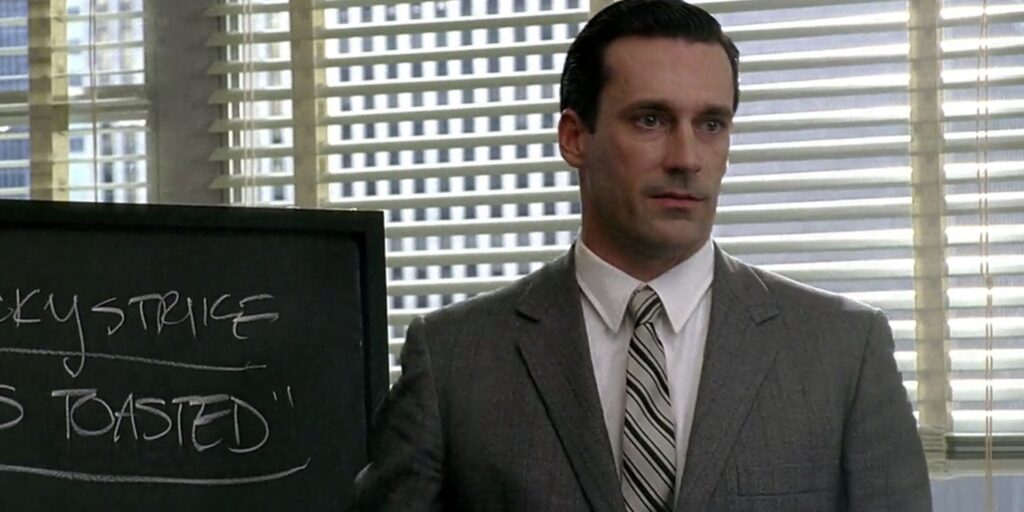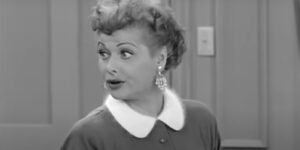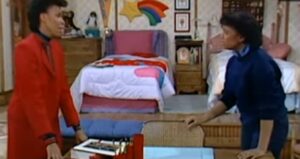
Today, I explain how Mad Men wrote itself into a major corner in its first episode, and the only way out was for Don Draper to be brilliant (he was brilliant).
This is “All the Best Things,” a spotlight on the best TV episodes, movies, albums, etc.
This is a Year of Great TV Episodes, where every day this year, we’ll take a look at great TV episodes. Note that I’m not talking about “Very Special Episodes” or episodes built around gimmicks, but just “normal” episodes of TV shows that are notable only because of how good they are.
A while back, I wrote about how a problem with TV shows that are set in creative industries is that the characters are meant to be really good at their jobs, but the writers of the TV show are not good enough to MAKE the characters really good at their jobs. Aaron Sorkin is a brilliant TV writer, but he’s no sketch comedy writer, and thus, the “brilliant” sketches on Studio 60 on the Sunset Strip are not actually all that funny. I note that it is best to just have all of that stuff happen off screen if you can’t do a good job.
And that’s the rub, really? If your plot revolves around someone being really good at their field, you have to actually be a good enough writer to have them be really good at their field. The film Once works because the songs are legitimately really good. If they weren’t, the movie wouldn’t work. This busker who thinks he can make it would just be some busker with delusions, and not a guy with real talent who just needs a break.
Similarly, the pilot of Mad Men, “Smoke Gets in Your Eyes,” opens with advertising executive Don Draper (Jon Hamm) in a seemingly impossible situation. The firm’s biggest client, a cigarette company called Lucky Strike, can no longer advertise about its health benefits now that the government has banned the use of health claims in ads, and there are also new reports in a big story in Reader’s Digest about how UNhealthy cigarettes are. He is seemingly boxed in. There is no good avenue to take, and the clients are coming into town for a new ad campaign that Don has not yet figured out. He is totally lost. The greatest idea man around has NO idea.
Now, there are a number of other excellent plots in the episode, including the introduction of all the major Mad Men characters like Peggy (Elisabeth Moss), Pete (Vincent Kartheiser), Joan (Christina Hendricks) and Roger (John Slattery), but the episode truly turns on two things…
1. Seeing Don booze his way around New York City, having casual sex, before we learn at the end of the episode that he is actually married with two kids (January Jones plays Betty Draper).
2. Don has to pull off the ad campaign.
So the episode writer (and show creator) Matthew Weiner has to have Don be brilliant, or else the scene doesn’t work. He can’t just be “pretty good.” He has to be brilliant for the build up of the entire episode to be paid off.
And, well, Don is brilliant.
He explains that the fact that all of their advertising avenues are cut off is good because it means that the OTHER companies are in the same boat, so that they can now make ANYthing their ad campaign. Here’s the scene:
Don Draper: This is the greatest advertising opportunity since the invention of cereal. We have six identical companies making six identical products. We can say anything we want. How do you make your cigarettes?
Lee Garner, Jr.: I don’t know.
Lee Garner, Sr.: Shame on you. We breed insect repellant tobacco seeds, plant them in the North Carolina sunshine, grow it, cut it, cure it, toast it…
Don Draper: There you go. There you go.
[Writes on chalkboard and underlines: “IT’S TOASTED.”]
Lee Garner, Jr.: But everybody’s else’s tobacco is toasted.
Don Draper: No. Everybody else’s tobacco is poisonous. Lucky Strikes’… is toasted.
Roger: Well, gentlemen, I don’t think I have to tell you what you just witnessed here.
Lee Garner, Jr.: I think you do.
Don Draper: Advertising is based on one thing: happiness. And do you know what happiness is? Happiness is the smell of a new car. It’s freedom from fear. It’s a billboard on the side of a road that screams with reassurance that whatever you’re doing is OK. You are OK.
Lee Garner, Sr.: It’s toasted.
[Smiles]
Lee Garner, Sr.: I get it.
I mean, come the heck ON, right? It’s just amazing writing. Weiner won the Emmy for Outstanding Writing in a Drama Series for the episode, and the director of the episode, Alan Taylor, was nominated, as well (the episode also won an Art Direction for a Single-Camera Series and Cinematography for a One Hour Series).
It’s amazing how hard it was for this to work, and yet it totally worked. It showed that this series was definitely going to be a special one (and it was).
Okay, if I’m going to have 360 more of these, I could use suggestions, so feel free to email me at brian@poprefs.com!










The problem is that, even here, Don is only fiction-good. The “It’s toasted” slogan for lucky strike was real, but from decades prior to the start of the series. The idea of it being a solution to problem only a brilliant ad man could ever solve is fabricated. It’s still a truly great episode, and great piece of writing, but weiner knows no more about writing great ads than sorkin does writing great sketches. He just built a wonderful puzzle to which an existing ad was the solution. Studio 60 would have been vastly different if they were presenting classic snl sketches as though they were the creations of the characters, whose dramatized lives and motivations were still strictly fictional.
Sure, that was an advantage for Weiner, that people don’t know famous ads like they know famous comedy sketches.